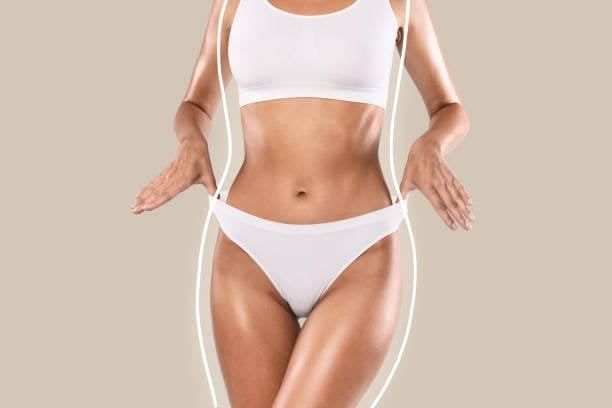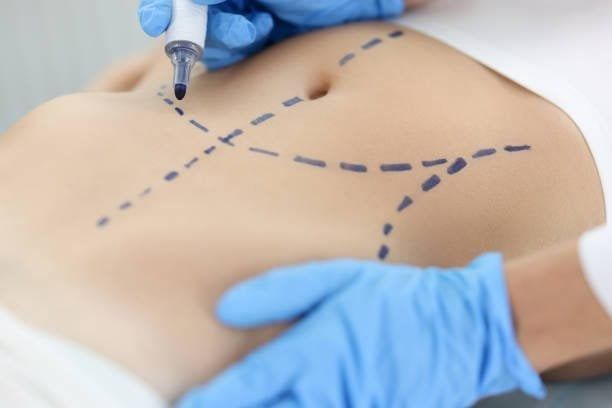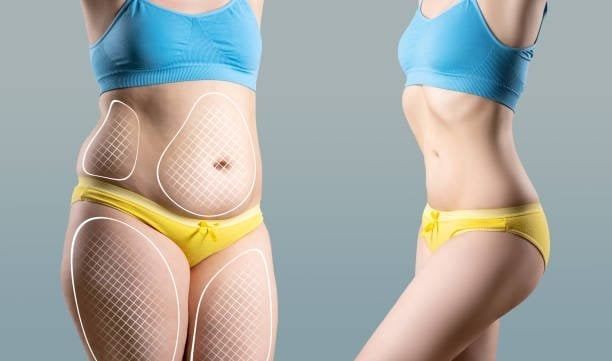Liposuction has long been regarded as a popular cosmetic procedure for body contouring and fat removal. With the
increasing interest in aesthetics and body sculpting, Nairobi has seen a rise in individuals seeking liposuction to
achieve their desired physique. Liposuction has become a go-to option for people looking to reduce stubborn fat in
certain areas or enhance their body's proportions. Read along as we delve into what liposuction is and shed some
light on this procedure.
What is liposuction?
Liposuction is also known as lipoplasty or suction-assisted lipectomy. It is a cosmetic surgical
procedure designed to remove excess fat from specific areas of the body. It's not a weight-loss solution but rather
a method of contouring and shaping the body by eliminating fat that has proven resistant to diet and exercise. This
procedure involves using a suction technique to remove fat from areas such as the abdomen, thighs, buttocks, arms,
and neck. Though liposuction can be performed on various body parts, it's essential to have realistic expectations
about the outcome.
How does liposuction work?
Liposuction isn't a one-time solution, but rather, involves several steps. These steps are:
- Consultation - During the consultation, the surgeon will assess your medical history, skin condition, and body
type to determine if you are a good candidate for liposuction. They'll also discuss your goals and expectations
to ensure that you are choosing the right treatment.
- Anaesthesia - Liposuction is typically performed under local anaesthesia with sedation or general anaesthesia,
depending on the extent of the procedure. The anaesthesia helps ensure you remain comfortable throughout the
process.
- Incisions - Small incisions, usually around 2-4 millimetres in length, are made in the targeted areas. The
surgeon will then insert a cannula (a thin tube) through the incisions. This cannula is used to break up and
suction out the fat.
- Fat Removal - The cannula is moved back and forth to break up the fat cells, which are then suctioned out. The
suction is done using a vacuum or a mechanical pump. The fat is carefully removed to ensure that the areas
remain smooth and well-contoured.
- Recovery - After the procedure, patients are monitored as they wake up from anaesthesia. Some swelling,
bruising, and discomfort are common, but these symptoms typically subside after a few days to weeks.
Different types of liposuction
Liposuction has evolved significantly over the years, with new techniques and technologies providing more effective,
less invasive treatments. The most common types of liposuction procedures include:
- Tumescent Liposuction - This is the most common technique. A large volume of saline solution,
including lidocaine and epinephrine is injected into the treatment area. The lidocaine is a local anaesthesia,
which reduces or prevents pain while epinephrine helps to reduce bleeding. This makes the fat easier to remove
and minimizes blood loss. It also makes the procedure pain-free and comfortable for the patient.
- Ultrasound-Assisted Liposuction (UAL) - Ultrasound energy is used to liquefy the fat before
it's removed. This method is particularly useful for removing fat from fibrous areas like the male chest
(gynecomastia) or the back.
- Laser-Assisted Liposuction (Smart Lipo) - A laser is used to liquefy fat cells, which are then
removed through a thin cannula. Laser liposuction is less invasive and offers the benefit of skin tightening due
to the heat generated by the laser.
- Power-Assisted Liposuction (PAL) - This technique uses a vibrating cannula to help break up fat
tissue, making it easier to remove. It can be faster than traditional methods and is particularly effective for
larger areas.
- Vaser Liposuction - Vaser uses ultrasound technology to emulsify the fat, which is then removed
through suction. This technique offers more precision and is often favoured for its ability to preserve
surrounding tissue and minimize damage.
Why choose liposuction?
Here are some reasons why individuals opt for liposuction:
- Targeted fat removal - Liposuction allows patients to target specific areas of fat, creating a more balanced and
sculpted body shape.
- Improved body contours - Liposuction helps in achieving smoother, more proportional contours in areas like the
abdomen, thighs, and arms.
- Boosted confidence - After the procedure, many patients report increased self-esteem and a better body image, as
liposuction can create a more toned and flattering silhouette.
Who Is an Ideal Candidate for Liposuction?
As popular and effective as liposuction is, it isn't suitable for everyone. To be a good candidate, you should:
- Be in good health - Liposuction is a surgical procedure, so it's essential to be in good overall health to
reduce the risk of complications.
- Have stable weight - Liposuction is not a weight-loss procedure, so patients should be near their ideal weight.
It works best for those who have localized areas of fat.
- Have realistic expectations - While liposuction can improve body contours, it is important to have realistic
expectations and understand that results can vary from person to person.
- Be a Non-smoker - Smoking can interfere with healing and increase the risk of complications. Patients are
generally advised to quit smoking before and after the procedure.
What to expect during the liposuction process?
Nairobi has numerous clinics and hospitals that offer liposuction. Most of these facilities adhere to international
standards in terms of safety and quality. Here's what you can expect when you decide to undergo liposuction in
Nairobi.
- Consultation - The first step of the procedure is a thorough consultation with your surgeon. The surgeon will
take the time to understand your concerns and expectations. It's also important to disclose your medical history
to ensure the procedure is safe for you. You'll be asked to undergo some pre-operative tests, which may include
blood work and physical examinations.
- The procedure - The actual liposuction procedure is done by the surgeon and his assistants. They use advanced
techniques to ensure maximum precision and minimal discomfort for the patient. The procedure typically takes
between 1-3 hours depending on the areas being treated.
- Post-operative care - After the procedure, you will be provided with compression garments to help reduce
swelling and improve the healing process. Your surgeon will give you detailed instructions on how to care for
your body post-surgery, including how to handle any pain, manage swelling, and how to care for the incisions.
- Recovery timeline - Recovery time can vary, but generally, most people can return to work within a week, though
strenuous activities should be avoided for a few weeks. Swelling and bruising may last for several weeks, but
results should become noticeable within 1-2 months. Full results typically appear after about 6 months, once the
body has fully healed.
Risks and side effects of liposuction
Liposuction is a surgical procedure and just like any surgery, it carries certain risks. While most people recover
well, it's essential to be aware of the potential side effects. These include:
- Infection - As with any surgery, there is a risk of infection. However, this happens rarely with proper
aftercare.
- Scarring - Liposuction involves small incisions, and while the scars are usually minimal, they can still be
visible, depending on how your body heals.
- Swelling and bruising - Some swelling and bruising are common and can last for several weeks. Compression
garments help to manage this.
- Uneven results - In some cases, fat may not be removed evenly, leading to uneven or lumpy areas on the skin.
However, this is rare when performed by a skilled surgeon.
- Blood Clots - Like any surgery, there is a risk of blood clots forming, especially if you don't follow the
post-op guidelines for movement and activity.
Cost of liposuction in Nairobi
The cost of liposuction in Nairobi varies depending on several factors. These factors include: the type of
liposuction, the areas being treated, the clinic or surgeon's reputation, and the extent of the procedure. Here's a
general idea of what you can expect and the average costs for liposuction:
- Small Areas (e.g., Chin, Arms) - Ksh.100,000 - Ksh.250,000
- Larger Areas (e.g., Abdomen, Thighs) - Ksh.250,000 - Ksh.600,000
- Multiple Areas - If you're having several areas treated at once, the price can range from Ksh.500,000 to
Ksh.,000,000
Post-liposuction care and lifestyle tips
- Compression garments - Wear these consistently for the first 4-6 weeks as advised. They help reduce swelling and
support skin retraction.
- Hydration and nutrition - Eat a balanced diet rich in protein, vitamins, and antioxidants to support healing.
Avoid alcohol and salty foods, which can increase swelling.
- Mobility and light exercise - Light walking is encouraged a day or two after surgery to prevent blood clots.
More intense exercise should wait at least 2-4 weeks.
- Sleep position - Elevate treated areas (especially if the abdomen or thighs were targeted) and avoid sleeping
directly in those regions.
- Avoid smoking - Smoking impairs circulation and slows healing. Surgeons recommend stopping for at least 4-6
weeks before and after surgery.
- Monitor for complications - Watch for signs of infection (redness, fever, unusual discharge) or blood clots.
Always follow your surgeon's instructions and attend follow-up appointments.
FAQs About Liposuction in Nairobi
Discomfort is minimal during the procedure due to anaesthesia. Post-operative pain can feel like soreness or
bruising, similar to intense muscle soreness. Painkillers are prescribed to help manage this.
- Can the fat come back after liposuction?
The fat cells that are removed do not regenerate. However, if you gain significant weight after surgery, the
remaining fat cells can expand, and fat may accumulate in other areas.
- How long does recovery take?
Initial recovery is usually within 1-2 weeks, but full recovery can take 1-3 months depending on the extent of the
treatment.
- Will liposuction help with weight loss?
No. Liposuction is a body contouring procedure, not a weight-loss method. Ideal candidates are already close to their
target weight.
- Can liposuction treat cellulite or loose skin?
Liposuction is designed for fat removal, not skin tightening or cellulite treatment. In some cases, laser-assisted
liposuction may mildly improve skin tone, but severe sagging may require a lift procedure.
Liposuction is generally safe when performed by a qualified and experienced surgeon. Like all surgeries, it carries
some risks, which can be minimized through proper pre-and post-operative care.
- How do I choose a good surgeon in Nairobi?
Look for board certification, surgical experience, clinic reputation, and patient reviews. Always ask to see
before-and-after photos and discuss the surgeon's experience with cases similar to yours.
How to choose the right surgeon or clinic in Nairobi
Choosing the right clinic and surgeon is crucial for a safe procedure and good results. Here's what to look for.
- Board certification - Your surgeon should be certified by a recognized board in plastic or cosmetic surgery.
- Experience - Look for a surgeon with specific experience in liposuction, preferably with a portfolio of past
results.
- Patient reviews - Read testimonials, ratings, and reviews online from previous patients.
- Before-and-after gallery - Reputable surgeons maintain a portfolio of their work. Ask to see cases similar to
your body type.
- Technology used - Modern clinics should offer advanced techniques like laser-assisted or VASER liposuction.
- Consultation quality - A thorough, pressure-free consultation is a good sign. If a clinic rushes or avoids your
questions, that's a red flag.
- Facility Accreditation - Ensure the clinic is clean, licensed, and equipped for emergency care.
Myths and misconceptions about liposuction
Some myths and misconceptions about liposuction include:
- Liposuction helps you lose weight.
This is inherently untrue. Liposuction is for reshaping, not for major weight loss. It's most effective for removing
stubborn fat pockets.
- The fat can never return.
While removed fat cells are gone permanently, poor diet or lifestyle can cause fat to return to untreated areas.
- It's a substitute for exercise.
Liposuction complements a healthy lifestyle but does not replace the benefits of regular physical activity.
- Liposuction tightens skin.
Standard liposuction doesn't tighten loose skin. The skin may retract if you have good elasticity, but older patients
or those with significant sagging may need a skin-tightening procedure.
- Only women get liposuction.
Men are increasingly seeking liposuction, especially for areas like the abdomen, flanks ("love handles"), and chest
(gynecomastia treatment).
The psychological and emotional impact of liposuction
The decision to undergo liposuction is often deeply personal, and its effects go beyond the physical:
- Increased confidence - Many patients feel more comfortable in their clothes and social situations after
achieving their desired body shape.
- Improved motivation - Seeing a sculpted result can encourage patients to adopt healthier habits to maintain
their results.
- Mental health benefits - For some, especially those who have struggled with body image for years, liposuction
can provide a sense of relief and satisfaction.
- Risks of disappointment - Unrealistic expectations can lead to dissatisfaction. That's why thorough
consultations and clear goal-setting are crucial before surgery.
Final Thoughts
Liposuction can be a life-changing procedure for those seeking to enhance their body contours and boost their
self-confidence. If are you in Nairobi or its environs, and you are interested in getting a liposuction, then look
no further than Avané Dermatology Clinic. Here, we have a dedicated
team of dermatologists and professionals with years of experience and expertise who will help transform your
life. We are located at the Yaya Centre in Upper Hill and the United Nations Cres, In Gigiri. Feel free to visit us at our clinics or book your appointment to converse with our specialists.




